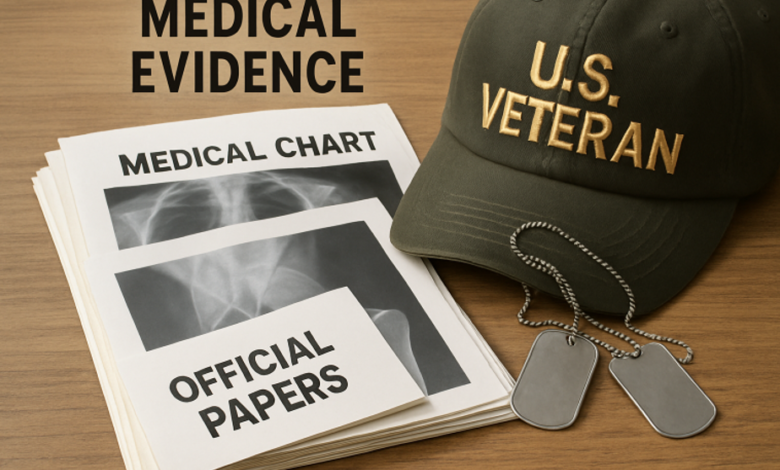Why Medical Evidence Matters Most in Veterans Disability Claims: A Comprehensive Guide

What Counts as Medical Evidence in a Disability Claim?
Medical evidence is the most critical factor in veterans’ disability claims. It encompasses a comprehensive array of documents, including service treatment records, physician notes, hospital discharge summaries, and diagnostic test results. Together, these items help the U.S. Department of Veterans Affairs (VA) determine if a veteran’s condition is linked to their service. Thorough documentation also clarifies the extent and severity of symptoms, increasing the likelihood of a favorable claim outcome. For more comprehensive support for filing a veterans disability claim, it’s critical to understand the value of assembling the correct medical records early in the process.
Combining official military documentation with reports from private healthcare providers establishes a robust factual link between service events and present-day health challenges. Veterans who compile both sets of records—detailing their injury, ongoing symptoms, and treatment—are in a stronger position to prove eligibility for benefits.
Types of Evidence Veterans Should Gather
Not all medical documents are equally valued by the VA. Veterans should gather both objective records, like X-rays, MRIs, and blood tests, and subjective notes, such as descriptions of pain, mental health symptoms, or functional limitations. Objective evidence confirms the existence and severity of conditions, while subjective accounts offer context on daily impacts—an important factor in VA’s decisions. Service medical records documenting the original injury or symptom onset are especially credible. When these are combined with civilian treatment records, including specialist reports and pharmacy logs, they provide a comprehensive timeline for claims review.
Common Evidence Mistakes Veterans Make
- Submitting incomplete or missing records
- Waiting too long to document symptoms or obtain a diagnosis
- Neglecting to include statements from private physicians or specialists
- Over-relying on personal accounts without corroborating clinical evidence
To maximize chances of approval, it’s essential for veterans to address these pitfalls. Ensuring all records—both military and civilian—are up to date and comprehensive is one of the most effective strategies for a successful claim.
The Value of Expert Opinions in Supporting Disability Claims
Medical expert opinions serve as the “nexus” in many disability claims, explicitly linking service events to present health problems. Board-certified specialists are particularly persuasive when they review a veteran’s file and submit formal written opinions that translate complex conditions into clear connections understandable by non-medical evaluators. The VA often gives significant consideration to these nexus statements and detailed medical opinions, so obtaining one can be crucial for complex or contested cases.
How Lay Evidence Can Supplement Medical Documentation
Lay evidence—personal statements from family, friends, coworkers, or the veteran—serves to fill gaps where medical evidence alone might fall short. These statements address aspects of daily life and symptom impact often absent from clinical notes. According to VA guidelines, such personal observations are valuable complements to medical records, especially when describing how a disability limits daily activities or ability to work. Including these perspectives can strengthen a claim by providing a fuller picture of the veteran’s experience. They help ensure that evaluators understand not only the medical facts but also the real-life impact of the condition.
Steps to Strengthen a Veteran’s Disability Claim
- Request and thoroughly review all military service and health records for completeness.
- Ask your healthcare team for written statements that summarize your diagnoses, symptom limitations, and expected prognosis.
- Document symptoms promptly and maintain a regular log of developments or changes.
- Obtain expert medical opinions—especially for explaining complicated connections between service injuries and disabilities.
- Collect lay statements from family, coworkers, or friends attesting to how the condition affects your daily life.
This organized, multi-layered approach ensures that the VA receives an accurate and compelling account of the service connection and the ongoing impact of a veteran’s disability.
See also: Understanding the Impact of Viagra on Men’s Health Beyond ED
Looking Toward the Future: Smarter Claims with Digital Health Records
Advances in digital technology are transforming how veterans gather and submit medical evidence. Online health portals, telemedicine, and secure document sharing allow for more seamless transfer of records between healthcare providers and the VA. The adoption of digital records promises a more efficient, accessible, and veteran-friendly claims process in the future.
Conclusion: The Power of Preparation
Achieving success with a veteran’s disability claim depends on quality, not just quantity, of medical evidence. Staying organized, seeking expert input, and submitting documentation that reflects all aspects of service and disability will set veterans apart. With careful planning and a proactive approach, deserving veterans can significantly improve their chances of receiving the benefits and support they have earned.



